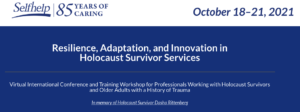On October 18 beginning at 2:15 pm EDT, I will be making a presentation as part of the conference offered by Self Help and the JFNA: “Resilience, Adaptation, and Innovation in Holocaust Survivor Services”. The event is a virtual international conference and training workshop for professionals working with Holocaust Survivors and older adults with a history of trauma. More details about the conference, including the link for professionals to register to attend, can be found by clicking on the image below.
My presentation will describe findings from an empirical study (Shrira and Felsen, 2020) which focused on the experiences of children of survivors (OHS) during the period between July and December 2020, and will also share observations from multiple online interactive webinars and meetings that emerged as a spontaneous intervention with OHS during the initial months of the pandemic (for example, see the videorecordings available on Youtube of my series of meetings organized by Dr. Jenni Frumer and sponsored by MorseLife Health System).
The period of time during the early months of the Covid-19 pandemic, before the availability of vaccines, was also a particularly eventful period in American political life, with the 2020 presidential elections in sight, and has sparked tremendous processes of protest in the social and cultural arena within the USA and elsewhere in the world calling for change with regards to issues of racism, systemic discrimination and social equity. Many felt that their unique reactions as children of Holocaust survivors, both the intensified fears, as well as the toughening and “hardening” related to a different perspective on what constitutes hardship, could not be fully understood by friends and relatives who are not children of Holocaust survivors.
The Covid-19 pandemic called attention to the mental health burden of loneliness which, already before the pandemic was referred to as the “epidemic of loneliness” and identified as a public health priority by US Surgeon General Vivek Murthy. Our findings show that a large segment of children of Holocaust survivors have been at a heightened risk for activation of Holocaust-related vulnerabilities during Covid-19, and other older adults with histories of trauma might be similarly impacted by the recent events. These observations highlight the need to plan for appropriate services and online psychosocial interventions for the current time while the pandemic has not come to an end, and beyond it, for future situations that prevent social engagement, in order to minimize the negative mental health burden for older adults with trauma histories during such periods.
Irit Felsen


Leave a Reply